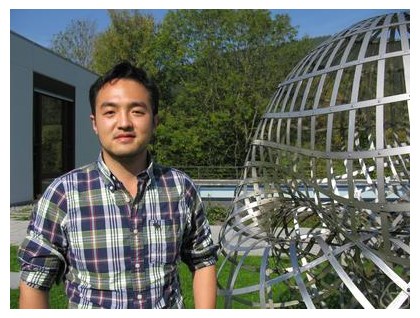2016 DST-ICTP-IMU Ramanujan Prize for Young Mathematicians from Developing Countries
jointly awarded by
- The Abdus Salam International Center for Theoretical Physics,
- The Department of Science and Technology (DST, Government of India), and
- The International Mathematical Union (IMU).

It is our pleasure to announce that the winner of the 2016 Ramanujan Prize for Young Mathematicians from Developing Countries is Chenyang Xu of Beijing International Center of Mathematical Research in China.
The prize is in recognition of Xu's outstanding works in algebraic geometry, notably in the area of birational geometry, including works both on log canonical pairs and on Q-Fano varieties, and on the topology of singularities and their dual complexes.
More specifically, Xu proved in joint works with C. Hacon and J. McKernan the boundedness of log canonical pairs and resolved in the affirmative Shokurov’s ACC (Ascending Chain Condition) Conjecture on log canonical thresholds. Xu established in a joint work with C. Li a procedure by which any generically Q-Fano test configuration can be replaced by a special test configuration with Q-Fano fibers such that the Donaldson-Futaki invariant does not increase, thereby reducing K-stability issues to testing against such special test configurations. Xu proved the finiteness of algebraic fundamental groups of klt (Kawamata log terminal) singularities and in a joint work with Kollár proved for a Calabi-Yau pair (X, D) that the fundamental group of the dual complex of D is a quotient of the fundamental group of the smooth locus of X.
Building his work in part on applications and ramifications of methods from the Minimal Model Program, Xu has now demonstrated expertise over an impressively wide range of techniques in algebraic geometry and beyond to tackle a broad spectrum of geometric problems from birational geometry in characteristic 0 and characteristic p, topology of algebraic varieties, arithmetic geometry and Kähler geometry, and he has contributed to the strengthening of the subject of algebraic geometry in China.
The selection committee consisted of Idris Assani, Rajendra Bhatia, Stefano Luzzatto (chair), Maryam Mirzakhani, Ngaiming Mok. The nominations this year were extremely strong. The final decision was based on the current rules and guidelines of the prize and was carried by a majority vote.
















